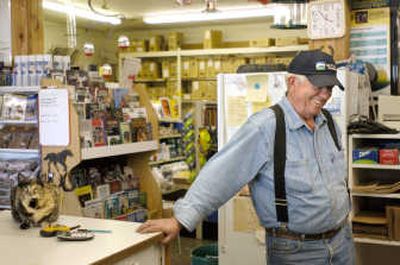Feed stores join the ‘burbs

SWEET HOME, Ore. — When Garry Burks started working at Santiam Feed & Garden in the spring of 1975, the business was in transition. After years of grinding, cleaning and bagging his own livestock feed from bulk grain, owner Stan Ego had decided to get rid of his feed mill and start stocking bagged feed instead.
Times were changing. The mid-valley — like much of the country — was undergoing a subtle shift away from its agrarian roots and toward a more urban way of life. Ego decided to shift along with his customers, a lesson Burks took to heart when he bought the business in downtown Sweet Home from his former boss in 1984.
Today, in addition to such traditional staples as hay bales, chicken feed and vegetable seed, Burks and his wife, Cathy, carry pet food, nursery stock and lawn and garden supplies for a clientele that could be described as city folks with a taste for country living.
“Most of them are not farmers and are not ranchers,” Burks said. “Some will live on several acres or just in the country.”
Burks sees them as people looking to get back in touch with their rural roots.
“It takes them back to an earlier era,” Burks said. “Everybody likes a little bit of the country in life.”
You can still find old-fashioned feed stores scattered across the mid-valley, but the ones that are still around have all found ways to change with the times.
“If you have animals, we can feed ‘em,” said Dave Habbestad of Cherry Tree Farm Supply in Philomath. “We have (feed for) everything from gerbils to cows to horses to llamas and alpacas.”
The store also stocks a full range of pet toys and supplies, farm chemicals, fencing materials, gates and hardware.
“We cater to the backyard farmer,” said Habbestad, who bought the business with his wife, Jan, in 1993. “Most of them are less than 20 acres.”
While Cherry Tree still serves a handful of commercial operators, most of its customers care more about having a rural lifestyle than running an agribusiness.
“They teach school or work for the county or work for the state or whatever, but they still have the home place they want to take care of,” Habbestad said. “There’s a lot of people like that between here and the coast.”
The sweet smell of baled hay still fills the warehouse at Denson’s Feed & Seed, but third-generation owner Casey Denson said the Corvallis feed store has changed in a multitude of ways since his grandfather started the business back in 1930.
“Farms used to be 5 to 25 acres. Now people have thousands of acres,” Denson said.
Large agricultural operations buy feed, seed and farm chemicals in large quantities, so they deal with big suppliers such as Wilbur-Ellis or Simplot. As a result, hometown feed stores such as his have had to adjust their product mix to fit a new crop of customers.
Today, Denson’s Feed & Seed carries a full line of work clothes as well as Western wear, rubber muck boots and cowboy hats. Pet food is a big item, along with horse tack, garden starts and supplies, and wild bird feeders.
Of course, you can get all that stuff and more at the superstore chains. But you won’t get the same experience you can still find at a place like Denson’s, where the heavy scent of molasses from the animal feed hangs in the air and the old floorboards creak under your feet as you stroll the aisles.
“Feed stores have really changed from the old mom and pop-type stores, like I’d call us, to the big box-type stores,” Denson said. “It’s nice to have the old wood floors.”